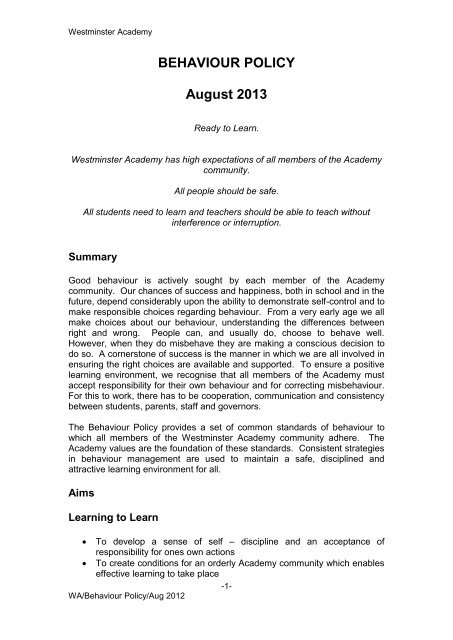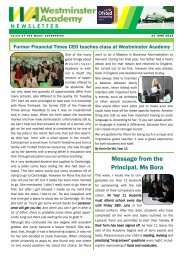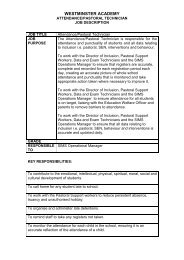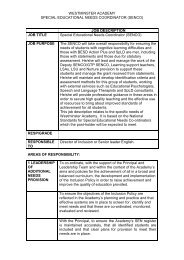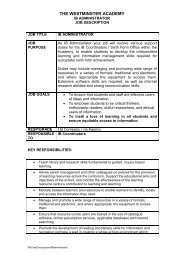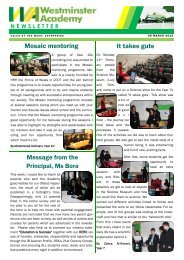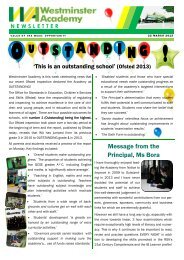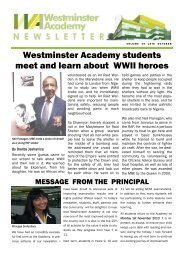Behaviour Policy - Westminster Academy
Behaviour Policy - Westminster Academy
Behaviour Policy - Westminster Academy
Create successful ePaper yourself
Turn your PDF publications into a flip-book with our unique Google optimized e-Paper software.
<strong>Westminster</strong> <strong>Academy</strong>BEHAVIOUR POLICYAugust 2013Ready to Learn.<strong>Westminster</strong> <strong>Academy</strong> has high expectations of all members of the <strong>Academy</strong>community.All people should be safe.All students need to learn and teachers should be able to teach withoutinterference or interruption.SummaryGood behaviour is actively sought by each member of the <strong>Academy</strong>community. Our chances of success and happiness, both in school and in thefuture, depend considerably upon the ability to demonstrate self-control and tomake responsible choices regarding behaviour. From a very early age we allmake choices about our behaviour, understanding the differences betweenright and wrong. People can, and usually do, choose to behave well.However, when they do misbehave they are making a conscious decision todo so. A cornerstone of success is the manner in which we are all involved inensuring the right choices are available and supported. To ensure a positivelearning environment, we recognise that all members of the <strong>Academy</strong> mustaccept responsibility for their own behaviour and for correcting misbehaviour.For this to work, there has to be cooperation, communication and consistencybetween students, parents, staff and governors.The <strong>Behaviour</strong> <strong>Policy</strong> provides a set of common standards of behaviour towhich all members of the <strong>Westminster</strong> <strong>Academy</strong> community adhere. The<strong>Academy</strong> values are the foundation of these standards. Consistent strategiesin behaviour management are used to maintain a safe, disciplined andattractive learning environment for all.AimsLearning to Learn To develop a sense of self – discipline and an acceptance ofresponsibility for ones own actions To create conditions for an orderly <strong>Academy</strong> community which enableseffective learning to take place-1-WA/<strong>Behaviour</strong> <strong>Policy</strong>/Aug 2012
<strong>Westminster</strong> <strong>Academy</strong>To develop mutual respect between all members of the <strong>Academy</strong>communityTo have consistent expectations and guidance about routines andproceduresCommunity PartnershipTo foster partnerships between home, the <strong>Academy</strong> and the widercommunityTo create a supportive environment where positive attitudes areencouraged and respectedTo involve the community in celebrating the positive aspectsassociated with appropriate behaviourTo promote the <strong>Academy</strong> as a central part of the communitySchool of the FutureTo prepare students to take on an effective role in societyTo appreciate the various roles in a modern society, e.g. consumer;parent; adult, etc.The Values we hold (HERO):HonestyEnterpriseResponsibilityOpportunityImplementationThe role of the studentThe student has a central role in the development of his/her own selfdiscipline:Through negotiation and discussion students are given choices, whichhelp them to develop a sense of responsibility for their own behaviourStudents participate in setting their own achievable targetsStudents are encouraged to discuss their problems in confidence with amember of staff with whom they feel secure, normally in the firstinstance a personal tutorWA/<strong>Behaviour</strong> <strong>Policy</strong>/Aug 2012-2-
<strong>Westminster</strong> <strong>Academy</strong>Expectations for studentsAll students must follow the WA10 rules:1. I follow instructions the first time2. I am in all my lessons on time3. I am in correct uniform and equipped to learn (pencil case, book, planner)4. I respect everyone and everything5. I keep my hands, objects and inappropriate comments to myself6. I complete work to the best of my ability7. I complete homework and daily revision8. I am actively involved in learning9. I can work on my own initiative10 I can work as part of a teamIf a student fails to follow these rules, he/she will be placed on report. Pleasesee section on „Alternative Provision‟ for more information about the reportsystem and next steps.The Role of the Parent/CarerIn the <strong>Academy</strong> home-school agreement, expectations are clearly outlined tothe parents/carers of prospective students prior to admission to the <strong>Academy</strong>.We are specific about the need for a collective approach in developingself-discipline in the children attending the <strong>Academy</strong>. Co-operation andsupport from parents/carers is sought and is vital if we are to besuccessfulWe expect that parents/carers will support the <strong>Academy</strong> <strong>Behaviour</strong><strong>Policy</strong>We expect that parents/carers will support their child by agreeing todiscuss any problems that arise and attend parental meetings followingfights or post exclusion meetings.We expect that parents/carers will celebrate with us their children‟ssuccessThe Role of the StaffStaff have an important responsibility to model high standards of behaviourwhen dealing with students and each other. TheyCreate a positive climate with realistic expectationsEmphasise the importance of being valued as an individualPromote, through example, manners and courtesyProvide a caring and effective learning environmentWA/<strong>Behaviour</strong> <strong>Policy</strong>/Aug 2012-3-
<strong>Westminster</strong> <strong>Academy</strong>Encourage relationships based on respect and understanding theneeds of othersEnsure fair treatment for all, according to the framework of our EqualOpportunities policyProvide guidance on improving standards of academic and behaviouralperformanceRepair and rebuild relationships that have temporarily broken downRespond positively to efforts made by students when they aregenuinely trying to effect a change in their behaviourShow appreciation of the efforts and contributions of allAll students and staff have the right to work to potential, free from disruption,abuse or threat. Therefore it is the responsibility of all <strong>Academy</strong> staff toensure there is a consistent approach to managing student behaviour and thatdisruptive incidents are effectively prevented and, when necessary, dealt with.The <strong>Academy</strong> promotes an ethos of positive behaviour management. Stafftreat students with respect and dignity, no matter how trying thecircumstances. Whilst dealing with problems, staff should be askingthemselves the question, “How would I feel if someone were dealing with mein this way?” If the answer is embarrassed, put down, uncomfortable orangry, then they need to re-evaluate their approach. The cornerstone of gooddiscipline is sound working relationships between staff and students. Likeanything else worthwhile, relationships have to be worked at and both partiesneed to exert themselves whilst striving for the goal of developing mutualrespect.GuidelinesThe emphasis is on positive action (recognition and reward) rather thannegative action (punishment). Problems which occur should be dealt withconstructively. Four kinds of discipline are needed to implement this positiveapproach:Preventative Discipline<strong>Academy</strong> values discussed with the children at the start of each dayClear expectationsAttractive classrooms and general surroundingsWell planned seating plans, access to equipment, clear labelling,room to moveCareful catering for mixed abilitySetting aside an area for „time out‟ especially for younger orvulnerable studentWA/<strong>Behaviour</strong> <strong>Policy</strong>/Aug 2012-4-
<strong>Westminster</strong> <strong>Academy</strong>Corrective DisciplineWhat to say when a child isn't working or is disruptiveDeliberately ignoring some behavioursCasual or direct questioningA simple warningDefusing potential conflictRe-stating <strong>Academy</strong> valuesGiving simple choices (do this now or we will have to talk about it atbreak)Taking a child aside from the groupThe use of logical consequence (the behaviour and the outcomeare related)Supportive DisciplineFollowing up a disruption later when the „heat‟ has subsidedEncouraging children whenever possibleRe-establishing a relationship after correcting a childDeveloping a behaviour „contract‟ with a childDeveloping a climate of respectBuilding a positive classroom toneApplying a „team‟ approachSelf- DisciplineStudents taking responsibility for their own actionsCommunity service and other sanctions which reinforce collectiveresponsibility or the need for reparation or compensationThrough 1:1 and individualised learning plan (ILP) setting own targetsfor improved behaviourManaging own reports and other behaviour monitoring proceduresSanctionsThere is a clear hierarchy of consequences related to <strong>Academy</strong> values, listedin the Sanctions document.However, outlined below are examples of unacceptable behaviour andsanctions which are available. This is not a tariff and each case must be dealtwith on its own merits. Sanctions will be applied fairly in accordance with DfEguidance and exclusion used when no other alternatives are available (refer toInclusion <strong>Policy</strong>).WA/<strong>Behaviour</strong> <strong>Policy</strong>/Aug 2012-5-
<strong>Westminster</strong> <strong>Academy</strong>Minor IncidentsThese incidents are dealt with by the classroom teacher and include, forexample: throwing paper; calling out; chewing; not following instructions;incomplete class work; no homework; lack of equipment.Sanctions could include: verbal reprimand note to parent in Student Planner; moving seat short detention phone call/letter home sent to shadow timetable place on class, department reportSerious IncidentsSerious incidents may include: truancy from school & lessons extreme rudeness to staff aggressive behaviour smoking refusal to comply with other sanctions theft bullyingSanctions may include: meeting parents/carers placement on Year Report Year Detention On site Police Officer involvement Internal exclusionVery Serious IncidentsThey include: persistency of the above serious incidents of bullying racial/sexual/disability harassment fighting causing injury bringing an offensive weapon to school (laser pens, knives, pellet guns,fireworks, scissors, this list is not exhaustive) involvement with drugs or alcohol Physical aggression to a member of staff will be treated with the utmostseveritySanctions available include: internal exclusion fixed term exclusion permanent exclusion Police involvementWA/<strong>Behaviour</strong> <strong>Policy</strong>/Aug 2012-6-
<strong>Westminster</strong> <strong>Academy</strong>Support structures for pupils causing concernStructures exist within the school to support pupils whose behaviour iscausing concern. Referral to these areas of support is via the tutor and in allcases parental involvement is essential.Procedures for dealing with unacceptable behaviourIt is the responsibility of subject teachers to deal with minor incidents whichoccur in the classroom.More serious incidents can be dealt with by the teacher with support fromthe Head of Department, but must also be recorded on SIMS.Year Co-ordinators will become involved if a student‟s behaviour is causingconcern in a number of subject areas. They may then log all incidents andtake appropriate action. They are also responsible for dealing with seriousincidents which are likely to result in exclusions.The <strong>Behaviour</strong> Monitor and Assistant <strong>Behaviour</strong> Monitor together with the<strong>Behaviour</strong> for Learning Lead are available throughout the day to removepupils from lessons where there is serious disruption. Subject teachersshould telephone reception on 3030 or send a sensible student to receptionwho will contact the behaviour monitor on duty. However, these incidents stillneed to be recorded to enable staff to deal with the matter. They must befollowed up later by the classroom teacher and possibly the Head ofDepartment.The Principal (or a member of the Leadership Group deputising for the Head)is the only member of staff who can sanction a fixed term or permanentexclusion. In the case of all exclusions, parents/carers are informed in writingof the reasons for the exclusion and their right of appeal. Excluded pupils areprovided with work for the duration of the exclusion.RewardsThere is a strong emphasis on rewards, through the Praise system, describedin the Routines and Procedure document.Rewards include: learning miles which can be exchanged for goods certificates given out at assemblies reward trips (for students with a high positive to negative ratio) phone calls home letters homeWA/<strong>Behaviour</strong> <strong>Policy</strong>/Aug 2012-7-
<strong>Westminster</strong> <strong>Academy</strong>Involvement of outside agencies• The school works positively with external agencies. It seeksappropriate support from them to ensure that the needs of all studentsare met by utilising the range of external support available.• Students needing support from external agencies are identified throughthe WAIT team. However, if necessary a student may moveimmediately to that stage to access support.Alternative provisionStudents who display poor behaviour will be placed on report. If a studentfails teacher report, this will escalate to department report. If a student failsdepartment report, this will escalate to Year Coordinator report etc.Please see below the hierarchy of the report system:- Teacher Report Department Report Year Coordinator Report <strong>Behaviour</strong> for Learning Lead Report PSP ASP GSPIf a student fails report and/or does not follow the school behaviour policy, anoffsite placement could be sought for this student.This is not the case for serious incidents, e.g. bringing a weapon to school, orpersistent disruptive behaviour. In these cases, a student could facepermanent exclusion straight away.Role of the Principal and Governing BodyThe Principal will oversee this policy and the Director of Inclusion will managethe policy and monitor its implementation. The Governing Body will review thepolicy annually and set up a Discipline Committee to meet students andparents, where behaviour is a cause for concern.Version 3AuthorA BanksReviewed by S Bora on 4 Oct 09Reviewed Checked by SB August 2011Approved by Governors October 2009Review Date January 2012WA/<strong>Behaviour</strong> <strong>Policy</strong>/Aug 2012-8-
<strong>Westminster</strong> <strong>Academy</strong>Appendix APositive Approaches to <strong>Behaviour</strong> Management in theClassroomWhen teaching, the student’s attention can better besustained by:Standing prominently in the roomEngaging in eye contact with individual studentsDemonstrating one‟s involvement with the subject: enhancing themeaning with vocal variations reinforced by bodily movements andfacial expressionsCount down (3-2-1) and hands upThe momentum and smoothness of the lesson will beimproved by:Ensuring a prompt and brisk startIntroducing the main theme clearly. Avoid dealing with side issues,unnecessary repetition of points already understood and interruptingone‟s teaching with lengthy reprimands or justification of one‟s actionsEnsuring there are no noticeable breaks in the lesson which could havebeen avoidedNot attending to individuals or small groups at the expense of the wholeclassUsing questions as a means of keeping students alert and accountable,and checking their understandingReserving questions which require time for thinking and lengthy repliesfor small groups or until the class is well behaved and attentiveAllowing time to conclude the lesson in an organised and orderlymannerA teacher will be less likely to contribute to unwantedbehaviour by:Not following it by rewarding attentionDiscouraging peer group attentionAvoiding an emotional outburstMaking it easier to do the work set than avoid itReprimands or instructions which interrupt students’activities convey more authority if:They are given only when necessaryWA/<strong>Behaviour</strong> <strong>Policy</strong>/Aug 2012-9-
<strong>Westminster</strong> <strong>Academy</strong>Contact is achieved before the message is given: students should besilent and attentiveThey are brief and clear as possibleThey are phrased as positive and clear directives (avoid negatives)Bodily movements are limited when speakingSpeech is delivered in „measured‟ toneChallenges to one’s authority are more likely to be avoided byStanding prominently in the roomAvoiding tension in body posture (smile, it helps you relax!)Using students‟ „territory‟ in a confident mannerMaintaining eye contact with students in a relaxed wayControlling one‟s own responsesNot answering or giving eye contact to those who call outChoosing not to return smilesResisting interruptionsEnsuring that the students respond to the teacher in some wayPostponing disputes with students until they can be settled in privateUsing „maybe… but‟ to redirect challenge to successTalking with your hands in a positive wayMoving 6-8ft away from student and get student to follow you – breaksemotional stateSitting down by the student and adopting a relaxed body postureFeeding back your observations and rephrasing to „what I would likeyou to do is …‟Reprimands and punishments are more likely to suppressunwanted behaviour if they:Interrupt the behaviour as early as possibleAre consistently applied and enforced. Threats should be backed upAre sufficiently disagreeable to discourage future misbehaviourDeal with the offence rather than the offender. Do not personalisereprimandsReprimands and punishments are most effective in establishing that a teachermeans what s/he says but are of least use in retrieving situations which areout of hand, as students have, by then, learned to disregard them. They playa limited role in establishing control compared with the techniques of goodmanagement and effective teaching.If you are unable to establish <strong>Academy</strong> classroom routines with a class afterten minutes seek help from a colleague. Using the checklist above, theymight spot points you have missed or just be an extra body to help. None ofus is perfect – we must all be prepared to support each other.WA/<strong>Behaviour</strong> <strong>Policy</strong>/Aug 2012-10-


